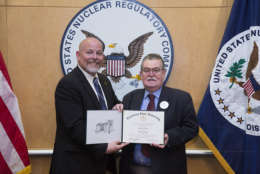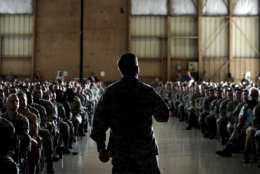National & World Headlines
-
The Army's Office of Energy Initiatives is the service's central hub for managing the financing and planning for "utility scale" renewable and alternative energy projects. Michael McGhee, OEI's executive director, talks with Jared Serbu about some of the major projects in the pipeline, and the Army's desire to use the power they generate to make its bases energy-independent.
July 14, 2017 -
A bill authorizing $696 billion in spending for the Defense Department, raising military pay by 2.4 percent for service members and creating a new branch of the military for space operations passed the House by a vote of 344–81. The bill authorizes enough funds to go head-to-head with sequestration as it makes a return in 2018 unless a budget deal is reached.
July 14, 2017 -
Over the past five years, the Army has been busily building renewable power facilities on its bases in order to reach an overall goal of 1 gigawatt of renewable energy by 2025. But now, the Army is putting more of an emphasis on using that energy to make its bases entirely self-sufficient from the public electric grid, so they can continue to function in the event of an outage. Michael McGhee, executive director of the Army Office of Energy Initiatives, talked with Federal News Radio’s Jared Serbu on Federal Drive with Tom Temin about the technologies the Army’s pursuing to make that a reality.
July 13, 2017 -
New legislative proposals from the Defense Department try to streamline the acquisition system, but do they compromise oversight?
July 12, 2017 -
Richard Spencer and his favorite business theory sailed through a July 11 Senate Armed Services Committee confirmation hearing.
July 11, 2017 -
The Nuclear Regulatory Commission recently saw one of its longtime employees off into retirement. Steve Lavie, had a long career working on a nuclear submarine in the Navy then at nuclear power plants on the East Coast and finally at the NRC. But when he enlisted in the Navy, he was just a few credits shy of receiving his college degree. His NRC colleagues saw to it that Lavie still had a chance to experience a college commencement, before his retirement this summer. Lavie tells his story to Federal News Radio's Nicole Ogrysko on Federal Drive with Tom Temin.
July 11, 2017 -
Representatives already submitted their amendments to the House Rules Committee for the bill and Federal News Radio compiled a list of the amendments you should watch when they get to the floor.
July 10, 2017 -
Rep. Rob Wittman (R-Va.), chairman of the House Armed Services Seapower and Projection Forces Subcommittee, wants to make sure the Navy reaches its magic number of 350 ships. Wittman spoke to Federal News Radio’s Scott Maucione on Federal Drive with Tom Temin about a bill he introduced that will help the Navy do that.
July 10, 2017 -
All of the Washington ways of getting things in and out of a defense budget are coming into play. Larry Allen, president of Allen Federal Business Partners, tells Federal Drive with Tom Temin, how contractors can at least keep track of the game.
July 10, 2017 -
The Navy announced its bonus reenlistment numbers for pilots in 2018. Meanwhile, Congress is trying to give more money to the Air Force to retain pilots.
July 10, 2017 -
The Air Force is changing some of its policies to bring squadrons into the 21st century. Meanwhile, the service is reviewing medically separated airmen's disability ratings.
July 10, 2017 -
The Army believes the future of ground combat will be markedly more austere than what troops became used to in Iraq and Afghanistan, and is rethinking its logistics enterprise for combat formations that will need to be more self-sufficient.
July 07, 2017 -
The Senate Armed Services Committee wants to cut some basic housing allowance for dual military couples to save money in the long run. The committee tried to make more drastic cuts last year, but they did not make it into law.
July 05, 2017 -
The Defense Department has started testing one potential technology to replace the Common Access Card. This one purports to identify users by the ways in which they manipulate their mouse and type on their keyboards.
July 05, 2017 -
The Senate Armed Services Committee's version of the 2018 National Defense Authorization Act cuts funding for several software programs the panel sees as underperforming, and implements what congressional officials say are corrective measures to DoD's IT buying habits.
July 05, 2017















